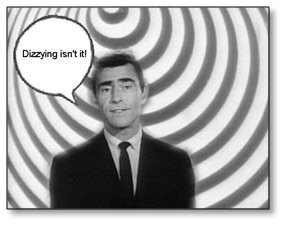 One of our senior-most Gonzo wizards gave me a call a while back and said: “Why wrack your brain to come up with the content for your next
GonzoBanker article? If you just keep track of the crazy stuff we see vendors put in contracts, the article will write itself.” Being the professional that I am, I of course thought that taking the path of least resistance was a SPLENDID idea and duly started recording weirdness that passes my desk. Much of what follows may seem boring, confusing, crazy and/or stupid, but the reality is, it’s the TRUTH!
One of our senior-most Gonzo wizards gave me a call a while back and said: “Why wrack your brain to come up with the content for your next
GonzoBanker article? If you just keep track of the crazy stuff we see vendors put in contracts, the article will write itself.” Being the professional that I am, I of course thought that taking the path of least resistance was a SPLENDID idea and duly started recording weirdness that passes my desk. Much of what follows may seem boring, confusing, crazy and/or stupid, but the reality is, it’s the TRUTH!
To set the stage for this article, we have to understand what contracts are supposed to be and what they really are. They are supposed to be an equitable agreement between the vendor and the institution that is not written to either party’s benefit. Ha! That’s a good one. An individual bank can’t afford a staff of attorneys to draft an agreement, and if it could, its vendor wouldn’t accept it anyway. So instead, the bank starts with the draft provided by the vendor. What’s wrong with that, you ask? The vendor writes the contract to protect its interests. And every time it loses some money or has a bad experience, the contract gets one section longer as a loophole-closing clause is added. The bank’s job is to review the agreement and find the most onerous terms and try to get some relief on them.
Here are some examples from the contracts that cross our desk on any given day. And before you get carried away and start saying you haven’t let your bank agree to terms and conditions like the following, perhaps you want to get your agreements out and look. We see the following ALL THE TIME! Let’s get started.
Truly Outrageous Language (outrageous to us anyway) Follows:
- “Both (Vendor) and Client agree that this agreement were actively negotiated and the agreement was not written to either party’s benefit, regardless of who was responsible for its preparation.” Okay, that’s a really good one. Maybe we can sell you some of our most excellent crop land here in Arizona if you believe that one. Of course it’s written to the vendor’s benefit. What’s the harm in leaving this in the agreement? Better ask your attorney about that, but trust me, in arbitration or litigation it isn’t good that the bank agrees in writing that the agreement is fair only to find problems with it down the road. This one should be stricken.
- “(Vendor) has the ability to change fees during the term of the agreement.” Wow. What do we need an agreement for in the first place? Silly me, I thought a contract was where we agreed to what the vendor is going to provide and what I am going to pay. How about we qualify this bad boy some?
- “During the renewal term, Client will pay current prices.” This innocuous statement seems pretty harmless. If I were a bank, I would assume this means my prices won’t go up on renewal. Unless, of course, the vendor used “current prices” as slang for its list prices, which many of them do. Remember that the agreement is drafted from the vendor’s paradigm. In this case, the agreement is going to revert from the bank’s negotiated prices to list prices during the renewal term. When in doubt over language, always try to clarify. Better change this one to “client will pay the same prices during the renewal term as during the initial term.”
- “All Prices are Estimates Only.” I see this ALL the time in agreements and the comment is usually in small print on the footnotes of the price schedule. This is putting a little too much pressure on the vendor’s “trusted partner role,” don’t you think? Any bank that allowed this into one of their agreements needs to stop right now, grab a black marker and write “Estimates are Bad” 100 times on a whiteboard. It is okay to have volumes estimated, but prices should never be.
- “(Vendor) shall make the final determination as to existence of any Defect.” If the vendor gets to make the call on what is a defect, then the vendor gets to determine whether it needs to fix the defect. This clause also sets forth when the bank has to pay for a fix versus when it is free. This sentence should be stricken or changed to the bank having final say.
- “(Vendor) shall have no obligation to audit, check or verify any Data submitted by the Client.” Sounds harmless enough. It’s the bank’s job to get the data correct before submitting, right? However, what about all of those years and years of system edits that were placed into the vendor’s software to prevent problems with data entry? Shouldn’t the bank be able to count on those? Absolutely. They are vital to how the systems run. Especially since in many cases, the data being submitted is coming out of another of the vendor’s systems. This sentence should be modified to include “systems edits as defined in the operating procedures.”
- “(Vendor) disclaims all warranties including Fitness for Particular Purpose.” This clause is the ultimate vendor protection and is totally one-sided. If we allow this term to survive, then we have just said that it is okay for the vendor to give you horse doo-doo and you can’t do anything about it. Two techniques offset this clause. The first is adding the ability to terminate the agreement if the vendor chronically misses its service level agreements (you have service level agreements, don’t you?). The second is adding a warranty of the service to match published documentation. The vendors have hundreds of thousands of hours of investment in the published documentation, otherwise known as operating procedures. These are part and parcel of the overall system. Most banks feel comfortable warrantying the service to these procedures, and it’s sure better than disclaiming everything.
- “Client shall dedicate sufficient resources to commence service within 180 days of the effective date of this agreement. Delays caused by reasons beyond Vendor’s control will cause Vendor to suspend delivery and Client shall pay any associated one time fees and maintenance through the balance of the term.” Okay. Let’s get this straight. The bank has to dedicate sufficient resources, but it doesn’t say anything about the vendor having to. Then if anything happens to delay the date the service goes live, the vendor gets the right to NOT provide the service AND bill the bank for the service anyway??? We recommend that as banks look through their agreements, they try to examine every clause to see if it should be reciprocal. This is a good example of one that should be reciprocal and better defined.
- “Telephone conversations between (Vendor) and Client and/or Customers may be monitored and recorded without further notice in order to maintain service quality.” Wait a minute. Is this even legal? How in the world can a bank give its vendor the right to eavesdrop on customers without notice? Even if it were legal, I can’t think of a bank out there that would dare do it. This statement is a good example of a clause that sneaks by when the bank doesn’t review every word of every line of the agreement.
 Many banks find themselves short of the needed expertise when it comes to reviewing terms and agreements provided by vendors. For those who find themselves in the unenviable position of representing the bank in a vendor contract negotiation, we offer up the following guidance to increase the chances of success.
Many banks find themselves short of the needed expertise when it comes to reviewing terms and agreements provided by vendors. For those who find themselves in the unenviable position of representing the bank in a vendor contract negotiation, we offer up the following guidance to increase the chances of success.
- If a clause seems unclear, ask for it to be rewritten. If it seems a clause doesn’t add value, ask for it to be removed. The goal is to start a dialogue with the other party regarding intent.
- Suggest language changes. If you don’t agree with something in the agreement, draft the language you feel is appropriate. It is much easier to get the desired result in this manner, than trying to do it through the other party.
- Involve external or internal counsel. These professionals are trained to protect the bank’s interests and read the language assuming the worst. Don’t, however, place the entire burden on counsel. Seventy-five percent of any agreement is going to be business terms and conditions on which counsel is not going to be able to provide input. These terms are on the bank’s shoulders.
- Get more eyes on the agreements. Some of the agreements we see run over 100 pages. No one person at the bank is going to find everything that puts the bank at a disadvantage. Having people from different disciplines and positions within the organization review the agreement often gives better insight into difficult-to-understand clauses.
- If a disputed point can’t be resolved, it might be better to just stay silent on it. In laymen’s terms, “being silent” means leaving the subject out of the agreement entirely.
 For instance, if the agreement says litigation has to occur in the vendor’s home state, and the vendor won’t change the language to say it can occur in the bank’s state, it would be much better to just leave it out. This gives the option down the road to file in the bank’s home state if action is initiated.
For instance, if the agreement says litigation has to occur in the vendor’s home state, and the vendor won’t change the language to say it can occur in the bank’s state, it would be much better to just leave it out. This gives the option down the road to file in the bank’s home state if action is initiated. - Read every word of every line. Don’t fall asleep. Lay in a good supply of 5-hour energy drinks and muscle through the agreement. The most onerous terms lay hidden in the deep recesses of the agreement in the smallest font, where they are most likely to be overlooked.
We hope these ruminations are helpful. Bankers who read all the way to the end of this article are already halfway to being good contract negotiators. Congratulations!
Happy Trails.
-br
Been there, done that – lots of times
Over the past decade, Cornerstone Advisors has negotiated contracts with virtually every major technology vendor in the industry. We put our proprietary database of vendor pricing and service terms to work to ensure you receive the best possible terms, conditions and price in negotiating your new or renewing contracts.
Visit our Web site or contact us today to learn more.